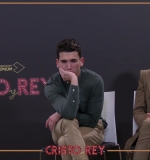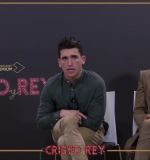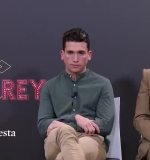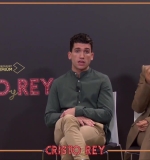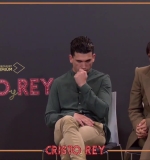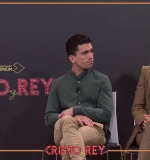Although fame exploded without expecting it, he did not give up enjoying acting. And now she does it with Cristo y Rey, the new Atresplayer Premium series.
Regarding the figure of Ángel Cristo, who more or less has a notion: the successful tamer, the turbulent relationship with Bárbara Rey, the fall into drugs, the mistreatment, the volcanic character… The same could be thought of the career Jaime Lorente’s professional career (Murcia, 1991) from the immediate success with the psychopath Denver in La Casa de Papel and the bad guy in Elite to the jump to Ángel Cristo in Cristo y Rey, the Daniel Écija series that premieres today on Atresplayer Premium and in a few months it will reach Antena 3. But here the nuances are very important.
Because what surrounds success is a nebula that the Murcian has been dissipating over the years and with professional help. “No way I’ve been happy. I’ve only gotten along well outside the gates. I have beaten myself a lot; I have suffered from depression and anxiety; I have been very lost, and I have felt very bad for having a privileged place that I did not enjoy when other actors are having drinks”.
Thus, without nuances, he unravels a path that we all intuit is ideal except for those who lived it. “I have invested a lot in psychologists and now I would not change everything that has happened to me for anything. I have learned that the people who lose their grip with success are because they were assholes before, when no one knew them and now we all know it”.
Looking at these years of career, are you happy now?
Yes, because I haven’t done anything I didn’t want to. I have committed myself and have helped my family a lot with my privilege. You catch me at a time where I am very proud.
For this reason, he has gotten involved in a project that looks like a national event and with aspirations for resounding success. Nothing works in Spain like the fall from grace of a real public figure. And even more so if Bárbara Rey, Chelo García Cortés, the emeritus King and an amalgamation of gossip, romances, sexual dalliances and scandals to remember or discover.
Although the filming was not without its problems. At least, for its protagonist. “There were things that I couldn’t even understand. Either he did them without thinking or it was impossible. I had an anxiety attack in a scene in which his daughter takes one of his drugs. I just became a father and you wonder what could happen in the real life. I started crying like a little child”.How much does paternity affect the work of an actor?
Being young it is impossible to be a good actor. I’m not saying you don’t do good jobs, but at 30 I can’t be because I still don’t understand many things. Being a father gives me more freedom and I suffer less because I prioritize the affective relationship with my daughter. Without being a father, I would not count Ángel Cristo like this.And the reconciliation? Because we always ask women this.
My girl and I have reconciled very well. We have worked as we could, but we agree. If she was pregnant for nine months, it’s my turn to smear now too.After all your problems, why have you returned to a series that is on the way to being a hit?
Because you have to understand that success is a consequence of your work. If I had not understood this after La Casa de Papel, I would have left this profession. Success is something that they spit in your face for which you are not prepared and for which I have had to work. I am enjoying this because now I feel brave and my circle takes it well with me.
Although it already sounds like a cliché, Jaime Lorente was one of those who thought that continuing made no sense. Because he felt “many times” alone without being so, he had a “fatal” follow-up from the tabloids and fans, and he did not enjoy filming for “fear of making mistakes”. There he held “the illusion” of the 16-year-old boy who set up stages in Murcia for a pittance and trained to be an actor until he succeeded. “My relationship with my work has never been success or being famous. It goes deeper. If charging 20 euros setting up stages, which is crap, I was excited and hungry, something was happening when I was not happy in a successful series. Or I blame my job and quit or take responsibility for my life”.
He chose the latter and was learning to deal with the blurry line between success and failure from the top. “You are very afraid that if the value that the rest gives you disappears, you will stop being a winner. My success now is in my wife, my daughter, my family, my money… That thing about money not giving Happiness that they tell you when you don’t have a daughter and can have certain privileges. You have to give value to real things because you are nobody if you believe that success is fame”.Does one come to feel that it is only a product?
It is that you are and it is not bad. We all are, another thing is that you are cheap and manipulated.And how many times have you felt alone?
Many times, because you start to displace the people around you when things go wrong. I remember that my girl told me one day if she understood that she would continue with me even if she was a baker.Why is she always associated with violent characters? Talking to you you don’t give that impression at all.
Being Denver in La Casa de Papel marked me, but I am not violent at all. I’m blocked by violence but I guess I’m good at getting pissed off.Well, in the world and in the series there are good doses of violence.
This series serves to denounce that there is still a lot of that violence left. And you understand that as a man you have a responsibility to report comments from friends. I have left WhatsApp groups where it was funny to say barbaric things against women.Have we men begun to adopt those behaviors that you had?
It is better to cross those people out of your life to avoid unpleasant moments. You have to do a brutal collective exercise and it is time to put limits on humor with the suffering of many people to have a more humane world. Enough of certain queer and black jokes, even if they are not hurtful. You have to set limits to live in a state of calm and respect.
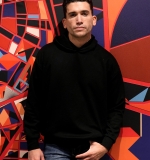
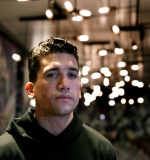
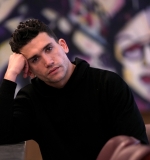

Source : elmundo.es
Jaime Lorente and Belén Cuesta play the tamer and the ‘star’ in the Atresplayer Premium series that reviews their turbulent marriage in a Spain that was beginning to taste freedom.
Anyone who lived in Spain between the eighties and the beginning of the 21st century and turned on the television from time to time or bought a magazine, will have an idea formed about the protagonists of this story. They were at the top, fell in love quickly, and soon after, all hell broke loose. The story of Ángel Cristo and Bárbara Rey goes from fairy tale to horror story in the barely eight years that their marriage lasted. Cristo y Rey, the series that Atresplayer Premium premieres this Sunday, takes as material the versions of its protagonists and what was reported in the media at that time to, in eight episodes, trace a path that goes from the dazzling lights of the circus and the spotlights of uncovering cinema and TV, to the darkness of drugs, addiction and violence.
The story begins with an Angel Christ at the top, collecting the title of best tamer in the world in Russia in 1969. Winner, married and happy. In the next scene, ten years later, he threatens with a gun whoever takes his tigers from the Russian Circus. Newly widowed from his first wife, his life is out of date and he is drowning in debt. Bárbara Rey is the muse of uncovering, an icon of openness, freedom and the Transition. She is at the top and rubs shoulders with the highest spheres —from the first episode, the series makes her relationship with Juan Carlos I explicit. To talk about the series that recounts the relationship between tamer and vedette, this newspaper brought together its creator, Daniel Écija, and the actors who play the two protagonists, Jaime Lorente and Belen Cuesta.
“It is the story of an era”, says Écija. “The series explains the journey of a country from a dictatorship to embrace freedom, but it is a country that drags characters who have been educated without knowing how to manage that freedom, with many defects. They are exponents of an education that many people suffered during the dictatorship and who had to deal with the explosion that was the Transition and freedom, with many deficiencies to deal with something as difficult as coexistence and love. For its creator, this story shows “endemic conflicts of individuals and society today”. “They were very modern, she especially. Ángel wanted to, but like so many individuals, they did not give him good cards”. Cristo, who died in 2010, dragged years of drug addiction problems, which he began using during his marriage. In 1989, Rey denounced him for mistreatment.
The writers and producers were soon clear that Jaime Lorente should be the one to play the tamer. “I didn’t know where I was going to go”, admits the actor. “I found out about his life and it seemed to me that the character was less interesting than what the series paints him to be. The first part, more of lights, more circus, was a lot of fun to do, but then we get into dark places. Normally, one feels identified with his characters in some things, but there came a time when I didn’t feel identified at all in anything”, admits Lorente.
Finding Bárbara Rey was more complicated. “We were searching and searching and nothing. One day Belén [Cuesta] appeared in these offices, put on a wig and did a bestial sequence, our jaws dropped”, recalls Écija of a decision that, a priori, did not seem the most natural due to the scant resemblance between the two. “When they asked me to do the casting, I didn’t know if I wanted to do it, because of the cliché and the image one has of her. But I wanted to get rid of it. In addition, it is a way of doing justice and for people to understand what this woman was and what she went through. She is a character that is very foreign to me, nothing to do with me, and at the same time, I feel a great responsibility for being able to tell her in the best possible way”, explains Belén Cuesta.
Fact and fiction
A sign at the beginning of the series warns that the plot is inspired by real events and characters, but that it has also been heavily fictionalized “for dramatic purposes”. “We have worked a lot with Bárbara and with Ángel’s entourage. We were able to speak with Payasito before he died [Francisco Javier García-Ontiveros, known as Payasito, was a friend of Ángel Cristo and died in October 2021]. I have had twenty-odd hours of conversation with Bárbara”, details Écija, who has also had the help of the journalist Chelo García Cortés, played in the series by Adriana Torrebejano. When this interview took place, Bárbara Rey had not yet seen the series because she wanted to wait to see it in its entirety. “He came to the shoot on the wedding day. It was very exciting for her. She is very concerned with what will excite her, the journey that the series will be for her”, continues the scriptwriter.Once they gathered the necessary material, the series has not hesitated to imagine with reality as a starting point. “Fiction is fiction and this is an interpretation of the time. I think that the essence and the pillars are honest, but I do want to work on the packaging to make it an exciting and entertaining journey for the viewer”, defends Écija about her approach to this story. “Of course, we did not avoid one of the conflicts that this relationship had, they are all there, from a responsible point of view, but that does not mean that we avoid them. When you talk about the king and the relationship with Barbara and you talk about responsibility, you may think that we have censored ourselves, but not at all”. Actor Cristóbal Suárez plays King Juan Carlos. “Good night, Majesty”, says Bárbara Rey in the first episode of the series. “How many times have I told you not to call me that?” Juan Carlos answers when she goes to one of her clandestine meetings. “All of that is in the series as we have investigated and as we believe it was. If not, we would not have started to make this series”, defends Écija.
For the actors, interpreting real characters that, moreover, are so etched in the recent memory of the country is a challenge that Belén Cuesta faces with concern. “I want her to feel moderately satisfied with the reflection that I give of her”. To prepare the character, Cuesta and Rey chatted one afternoon over coffee. “More than knowing what was real and what was not, I wanted to know what she was like in private, how María is more than Bárbara [Bárbara Rey’s real name is María García García], how she related to her father, how she spoke to his children, what he was like in intimacy with Ángel…”. “It is clear that I am not Bárbara Rey nor do I have her voice”, continues the actress. “I could have gotten closer to her character trying to imitate her, but I think I would have gone more into a parody. I wanted to tell the story, how he suffered, how he felt. I am the first who, when he sees a biopic, starts looking if they are similar or if they are well characterized. I assume that this is going to happen and that people will say that I don’t have such long legs. Obviously, I’m not Barbara Rey. But I want people to understand her story more than to see if I look alike or not”.
Pop characters
Along with titles like Veneno, Bosé, Nacho or Camilo Superstar, Cristo y Rey could be included in a national television trend that likes to look back at characters that have marked recent popular culture in Spain. “I think it is a way to look at ourselves”, says Belén Cuesta. “It also makes you see that the memories we have are often totally prostituted. You have something in your imagination and when you revisit it you realize that it was not like that”, adds Jaime Lorente.Écija explains this trend in a more pragmatic way: “It saves a lot of marketing and communication. At the time when hundreds of series are released a year, it is a shorter and cheaper way to generate interest in the viewer. But you also have to respond to the expectations generated by memory, which is quite unreliable”.
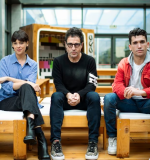



Source : elpais.com
They have just released 42 Segundos, a film that narrates the historical passage of the Spanish water polo team through the 1992 Barcelona Olympic Games. 42 Segundos, delicacy to narrate the change in the history of Spanish water polo.
A true story that had all the elements to become a movie. This is how Jaime Lorente and Álvaro Cervantes speak of the great feat achieved by the Spanish water polo team at the 1992 Barcelona Olympic Games. Many believed that the team led by Manel Estiarte had no options, and yet they took silver -and his first Olympic medal- in a heart-stopping final against Italy. Now, the story has been told again on the big screen through 42 Segundos, in theaters from September 2.
The film, directed by Àlex Murrull and Dani de la Orden, and with a script by Carlos Franco, tells the story of our country’s water polo dream team. How lifelong Catalan players got together with a group of new promises from Madrid and, under the harsh guidelines of Croatian coach Dragan Matutinović, prepared for the Games in which they would end up making history.
“The film recounts that journey. The sports journey, the emotional journey and how the two come together in the pool”, explains Jaime Lorente from the Old Estrella Damm Factory. The interpreter, who plays Pedro García Aguado in the film, shares the spotlight -and now table- with Álvaro Cervantes, who puts himself in the shoes of Manel Estiarte.
At the time of this interview, the film has not yet been released. In fact, there are only a few hours left for the preview, and nerves and emotion are sensed in equal parts. From what is said, because there has been involvement of some of the protagonists of the original story and because for a large part of the film’s team, this project that began to take shape in 2017 with Àlex Murrull and Cristian Valencia -producer and interpreter of Jesús Rollán on film- has been the biggest challenge to date. “I had vertigo”, admits Álvaro.
Like many young people born in the 1990s, the two-time Goya nominee for El Juego del Ahorcado (2007) and Adú (2020) only vaguely knew the story: “I did know about this selection that was mythical, but I didn’t know the ins and outs of it at all and what it had really meant. When I read the script, I was surprised that it hadn’t been told earlier”. “There are all the elements. That strange element that comes from outside, the common goal, the impediments…”, Jaime agrees.
“They gave me the script on a Friday afternoon and I devoured it. I knew I was going to do that character because I couldn’t say no. But over the weekend I was pondering what that was going to mean, that starting Monday my life I was going to change for a few months. It was such a big, titanic challenge, the fact of getting even closer to the idea of an elite athlete…”, assures the Catalan actor without being able to hide the passion that, like his partner, he feels for the project.
From actors to Olympic athletes: the training sessions carried out by the cast.
The team of actors that make up the main cast of 42 Segundos also had to become a water polo team. A transformation that required almost five months of training in which they not only had to learn to play, but also to move in the water like a player of this sport.“We had to learn to float, to swim, to breathe in the water… and to play water polo. We have had to learn many things and everything is ours”, the Murcian actor makes clear. “We can say that we have not had doubles”, Álvaro also comments proudly. And it is not for less: the Bernat Picornell Pools, which hosted the grand finale that August 92, have also been the setting in which Jaime, Álvaro and company went out of their way to recreate history.
Despite the fact that both have worked on historical projects that required physical effort, they say that 42 Segundos has been another level. “The first day we were in the water… I knew that Jaime had done an incredible job in El Cid and I had done Carlos, Rey Emperador, which for me had been the biggest challenge. But at that moment, in the water, I remember that we looked at each other and I told him: “I thought that after El Cid and Carlos a challenge like this was not going to come. It has arrived”, reveals the interpreter from Barcelona.
But 42 Segundos has not only required an added physical effort. It has also meant playing real people who were going to see the end result. Players, ‘Toto’ and Estiarte, whom these actors consider “so iconic and so good”, who lived through some years as intense as they were hard. And whose personal stories have lights and shadows.
Both Pedro -who even makes a ‘cameo’ in the film- and Estiarte have devoted themselves to the project, answering questions from both interpreters and, ultimately, helping them to understand their respective characters more. The involvement of the former players, they say, has been “absolute”.
“There has been a predisposition from both Manel and Pedro and other colleagues to let fiction make its way. It was very complicated, but they have understood very well how cinema works. How we have needed to put together things that perhaps happened in years in a period of time of six months. And they have been for us at all times. They have given us everything they are so that we can make them the best possible”, says the actor of La Casa de Papel. “The ultimate goal was for them to like it. That when Manel saw the film he would identify with it, recognize himself in some way, get excited and be calm. I would have been very screwed if it hadn’t been like that”, confesses Álvaro.
Sometimes it is talked about how an actor manages to ‘make his own’ a character. But is that possible when the character exists and is present in the project? “I had an acting teacher who talked about the obligations as an actor. If in a scene I read: ‘A girl enters the scene with a red dress’. What is mandatory for the scene to happen? That the girl wears a red dress. What obligations do I have as an actor for the character to be Pedro? And later, when these obligations are fulfilled, I can take some licenses. But the essence has to be there”, explains Jaime.
“When an actor imposes himself on the story, for me it is an erroneous way of approaching the work. You cannot tell yourself before the character. You have to withdraw as much as possible for the character to appear, although obviously this is also born of you and your experience”, adds the interpreter of the former captain of the national team.
42 Segundos has not only been the greatest challenge at an interpretive level but, in Jaime’s words, it has been “the most beautiful journey” to date. “For many reasons. Because of the character, because of the story, because of the team, because of my main ‘partner’ [points to Álvaro]. And because magical things have something that you can’t explain… It makes my hair stand on end”, reveals showing the arm. “It’s like this had to happen. And I tell many colleagues for whom it was their first project, that it’s a gift but it’s also a bitch, because you don’t know how difficult it is for it to happen again”, he says.
The best thing about this whole trip? That from a project that was born from the love that the filmmaker Àlex Murrull felt from the beginning for the original story -Álvaro confesses- a family has emerged. “The human team that has been created is the soul of the film. All the actors have left their lives even if they only had a few minutes (…). There was so much involvement that any gesture raised the film. There are moments of each partner that are brilliant because they are truly nourished”.
It was the first time that Jaime and Álvaro have coincided on the same project and, despite the fact that they recognize that they are very different and have different ways of working, the complicity between the two is palpable inside and outside the film. “I have a feeling that on several occasions when we were recording together, when they said ‘action!’ the moment became something sacred. Without doing anything special; it went without saying. We were there breathing another reality together, creating it”, recalls the Barcelonan.
“There is a photo in which we are on the same trip. We are listening to the director, but we are already preparing ourselves… There is something in the look of the two that indicates that we are on the same thing. It has been a perfect tandem. From some very good characters writings”, continues Álvaro. His co-star supports him: “We only discussed it later. I have never felt such a fine line between me and my character… I have been what is on screen during filming. That is acting, cinema”.




Source : mundodeportivo.com
The two actors play the medalists Manel Estiarte and Pedro García Aguado in the film 42 Segundos, which revives the legendary Spanish team that made history in the Olympic Games from Barcelona 92.
On the day of the (virtual) interview, a couple of weeks ago, Jaime Lorente (Murcia, 1991) greets the camera with a still sleepy face: he has slept an hour, he says, after finishing the filming of Cristo y Rey, the series he portrays the turbulent relationship between the tamer Ángel Cristo (whom he plays) and Bárbara Rey (Belén Cuesta). He is in Madrid, already recovered from the corneal injury that he suffered in said filming, and in a few hours he escapes for the well-deserved vacation.
On the next screen, Álvaro Cervantes (Barcelona, 1989) smiles with a more relaxed appearance. Also based in the capital, these days he rests in his Catalan refuge, recharging batteries for the imminent promotion and the premiere of the film that has brought them together for the first time on screen: 42 Segundos.
They are two actors on the rise, they share a generation, they are thirty-something years old and therefore they did not experience in first person the Olympic milestone of Barcelona 92 that their new film evokes. But they have passionately plunged into the personal conflicts, the sacrifice and the overcoming of that water polo team through their captain, Manel Estiarte (Álvaro Cervantes), and Pedro García Aguado (Jaime Lorente). That team that seemed to have few podium options a priori but to which the arrival of a Croatian coach, Dragan Matutinovic, who applied his military hand to the players, with cruel training, shook their game and their results, until an epic final, with silver medal.
Álvaro Cervantes speaks calmly, and looks like a discreet young man, with a point of surfer in vacation mode. Jaime Lorente seems more temperamental, he defines himself sensitively, and his career reveals him to be restless and versatile. Boxing, he has published a book of poems, A propósito de tu boca, plans to write and direct his own story (“I need to go beyond acting”, he has pointed out) and also composes and sings rap, with good reception.
Cervantes’ career has been progressive, without sudden media successes like Lorente, but solid and constant. Between his two Goya nominations (revelation for El juego del ahorcado and Adú) he has stood out in films such as Tres metros sobre el cielo, Hanna or El árbol de la sangre, with Júlio Medem, and series such as Carlos, Rey emperador or El tiempo que te doy.
Now they get into the shoes of two exceptional water polo players. Lorente plays Pedro García Aguado, a medalist who had to deal with his own addictions (“I missed the best moments of my life”), alcohol and drugs, which put his career in danger. Then Aguado has been able to take advantage of those experiences to help troubled young people as a coach on the successful television program Hermano mayor.
Cervantes plays Captain Manel Estiarte, the Maradona of water, the six-time Olympic water polo player. The film, directed by the prolific blockbuster Dani de la Orden and newcomer Álex Murrull, delves into the interiorities of that legendary water polo team, the rivalries and tensions, the Croatian coach who pushed them to the limit (Estiarte has come to say that humiliated them, subjected them to extreme training, such as ascents to the Andorran mountain), although it also injected them with the conviction that they could beat anyone.
For both interpreters, embodying Estiarte and García Aguado has required exhaustive preparation: they had to be convincing not only as fit actors, but also as elite athletes.
How were the trainings? Not as hard as the ones Matutinovic taught on his day, I imagine…
Jaime Lorente: I think that at our level it was as hard as it was for the real team with Dragan, because we started from scratch and we had to reach the level of elite players. The screen is not deceiving and we work very hard not to need specialists in any scene. We had a hard time getting to that level.An extra pressure to that of the paper itself…
Álvaro Cervantes: Yes, it is the first thing you ask yourself when you receive the script. That your life is going to be that of an elite athlete. You change the chip and think about how you eat, how you sleep, the number of hours you dedicate to exercise to perform at your best in the water.
Jaime Lorente: There is no other way…
Álvaro Cervantes: They gave me the script on a Friday night and I spent the weekend thinking about what was coming my way, knowing that I wanted to make the film. From then until the shooting, five months passed and it was all training.The rehearsals, in the water…
Álvaro Cervantes: The truth is that we end up more tired of water than we imagined a priori. At first we even decided to continue after filming in an amateur water polo team.
Jaime Lorente: It is clear that this was no more than an idea…
Álvaro Cervantes: It gave us the high, we wanted to keep that sport so hard that it cost us so much to achieve, but we have not fulfilled it. Apparently it is a sport that once you leave it, it is very difficult to return to it. When we both lived in Madrid, a former player began to train us, Rafa Fernández, a guy very dedicated to the film, who gave us a lot of power. Already in Barcelona, we had Tato, the official shooting coach. It was good because we reproduced that meeting between the actor-players who came from Madrid and those who were in Barcelona, just as it happened in reality and caused conflicts in its day due to the different way of understanding the sport. And that helped us situate ourselves in the script.Were they already in shape?
Jaime Lorente: I am an athlete, I have always liked running a lot.
Álvaro Cervantes: I don’t, really, I prepare myself when it’s time, but it’s hard for me. Until now I was not interested in sport, I did not understand it. Now I understand what it means also on a mental level.Do you see parallels with acting? In both cases, the rivalry must leave room for camaraderie, so that the result works.
Álvaro Cervantes: Dedicating your life to a competition seems very beastly to me, but the obsession that an actor can have in reaching an ideal of acting is actually something similar.
Jaime Lorente: Of course, there are points in common. They are two professions that depend on a human team, on how each element finds its place. That happens on a film set and on a soccer field.
Álvaro Cervantes: In this case, our physical training has also been our rehearsal and you rarely have so much time for it. The roles of each one in the team were forged in those sessions. And that complicity was noticed later on filming.
Jaime Lorente: A team was really created.Did the real protagonists, Estiarte and García Aguado advise you?
Jaime Lorente: They have always been very open to talk with us and totally in favor of the film.
Álvaro Cervantes: They have been very generous in telling us how they lived through it, who they are without hesitation, in meeting us and chatting while looking into our eyes. Something very valuable, because emotionally there are things that when you meet the person you detect and make you understand what they are like, how they lived it. It’s a gift. It is impressive to embody one of the best athletes in history, whom I already consider a friend. There were days that I called him before shooting to ask him for details… Priceless, wow.
Jaime Lorente: I saw in Pedro a hyper-special sensitivity. He seems like a huge guy to me, with a lot of charisma and sensitivity, which is where I clung to, that emotional, fragile part. Luckily he was very excited after seeing the film, very shocked and happy.
Álvaro Cervantes: I, to be honest, until I spoke with Manel after seeing the film, I was not completely calm. The biggest spectator for me was him. And he liked it, he told me very nice things.Did they tell you their opinion about the mistake that made that Olympic final get out of hand?
Jaime Lorente: There was a lack of communication or they just did what they had to do and it didn’t work out.
Álvaro Cervantes: If they had done anything else they would have disobeyed the coach. In the end, it is a team and you have to respect the rules. That coach, despite the fact that he gave them a hard time, led them there. In the final moment he indicated a type of defense that they considered inadequate. They looked at each other, clearly that order was out of tune, but Estiarte decided to go to hell with that instruction, even though he didn’t believe in it. Surely they regret having obeyed, but it is what they had to do.A special moment of the shoot.
Jaime Lorente: For me, the beginning of filming, when we did the scenes in the swimming pools. It was like starting on top of a mountain, the most difficult. We thought: if we can get through these weeks, the rest will be easier. We all had to take great care of ourselves, it was a litmus test.
Álvaro Cervantes: I remember moments with Jaime of looking at each other in the water when we almost couldn’t take it anymore. We no longer knew if it was us or the characters, encouraging us to comply. And that hug between all…How has this story enriched you?
Jaime Lorente: I would stay with the emotional journey that the film team has had, similar to the real one; the connection with everyone, who has worked hard to train. That pineapple that has been created I take with me forever; sometimes cinema and reality merge. This has been our cinematographic feat, also very hard.
Álvaro Cervantes: In the end, the film is about recognition, which in a more superficial way could be that medal, but above all how the characters end up recognizing the other, valuing the good that it brings them. It happened in the team and also between us. In the end, acting is just that: a back-and-forth job. You can’t work on this alone.They faced their fears. What scares you?
Jaime Lorente: Many things, many, although fear has never paralyzed me. Stay alone, that something happens to the people you love. Fear has many sizes.
Álvaro Cervantes: They face their fears because the other is with them. Beyond overcoming, sports feat, it is when they accepted themselves and the other that success came. Nobody achieves anything alone.
Jaime Lorente: It’s still a love story. Acceptance is one of the reflections of love. When one loves what is next to him and what he does, things turn out well or at least if they don’t turn out well they are beautiful.What do you think about this idea of success and failure? Winning is everything and silver is a failure, but it has gone further than ever.
Jaime Lorente: They are stipulated terms, but for me it is something totally subjective, hyper-individual, that lives within one. One can fail by winning a gold or succeed simply by entering the Games. It is very subject to what others consider of you. The movie recounts that journey, the realization that success lies elsewhere. And that with a silver in hand, when we hug, we say: “This is a success of ostia!”
Álvaro Cervantes: They explain that they felt pain in the heart for that silver medal, but that propelled them to win gold four years later. That preparation and that bittersweet silver was the learning, the real success. And that is something I share. Over time is when you understand things. It is necessary to give him the perspective that he needs at each moment, not to remain in the most instinctive perception.What do they have in common with their characters? Jaime, impulsive like García Aguado? Álvaro, introverted like Estiarte?
Jaime Lorente: I consider myself a good guy, and I try to have fun with the things I do. And there are innocent things about me that I try to take care of and I think he has. My demons also sometimes come out with too much force, I don’t control them, although there is always a ‘little light’ there.
Álvaro Cervantes: I am not as introverted as Estiarte in the film, but he is many more things, the film shows only part of it. I do share his determination and I understand the emotion of his search, of his preparation.How have you two connected personally?
Jaime Lorente: I think we agree on the love we put into work, we are both a little sick of this. I admire him a lot and if you admire someone, everything has been said.
Álvaro Cervantes: I agree with Jaime. It has been a great discovery, I admire his courage, his passion for the job. In this film I have experienced a sequence (I don’t want to reveal which one)… something that has happened to me very rarely. An instant of surrendering to the situation, the other, of flying as an actor, although it sounds cliché. A moment where the characters and the action took over us. For living moments like that I dedicate myself to this.In sport the objectives are very clear: podiums, medals… In your career, what is the goal?
Jaime Lorente: Me, support my family, now I’m a father…
Álvaro Cervantes: Live more characters and stories like this. I started when I was 15 years old, now I am 32… More than half my life working, it has passed very quickly. My goal is to continue enjoying what this profession offers me and the life, of course, of the people I love, of those who are yet to come.Jaime says goodbye, arrives late, goes on a trip: disconnection before the spotlight. Álvaro continues for a few more minutes in the telematic chat, explaining how much he enjoys the pre-shooting, the preparation of the character, that “getting into another world” and in projects that “I still cannot advance”. Now, he assures him, “what I need is to rest”. Cooking, “something I really like” and going to the movies a lot, which is difficult with filming. “I am seeing the entire billboard. And I will be in Donosti. I really want a movie binge”, he says.




Source : lavanguardia.com


